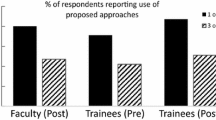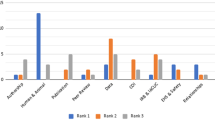Abstract
The importance of public confidence in scientific findings and trust in scientists cannot be overstated. Thus, it becomes critical for the scientific community to focus on enhancing the strategies used to educate future scientists on ethical research behaviors. What we are lacking is knowledge on how faculty members shape and develop ethical research standards with their students. We are presenting the results of a survey with 3,500 research faculty members. We believe this is the first report on how faculty work with and educate their PhD students on basic research standards. Specifically, we wanted to determine whether individual faculty members, who are advisors or mentors, differ in how they implemented components of responsible conduct of research (RCR) with their PhD students. Mentors were more likely than advisors or supervisors to report working with all of their PhDs, who graduated in the last 5 years, on the 17 recognized critical components of RCR training and research skill development. We also found about half of the faculty members believe RCR is an institutional responsibility versus a faculty responsibility. Less than a quarter have had opportunities to participate in faculty training to be a better mentor, advisor, or research teacher, and about one third of faculty did not or could not remember whether they had guidelines related to their responsibilities to PhD students. We discuss the implications of our findings and focus on ways that PhD research mentoring can be enhanced.
Similar content being viewed by others
Notes
Poehlman committed research misconduct for 10 years in many different research areas; he wasted $1 million on fabricated results and 10 papers were retracted. He was sentenced to 1 year and 1 day in jail for research misconduct. See: http://66.129.110.148/press-release-poehlman; http://66.129.110.148/content/case-summary-poehlman-eric-t.
Wakefield’s research misconduct altered the vaccine program in the United Kingdom such that many children did not receive vaccine because Wakefield had published an article in Lancet linking autism with the vaccine (Available at http://www.bmj.com/content/342/bmj.c7452.full.). He is banned from working in medicine or research in the UK http://videocast.nih.gov/Summary.asp?File=16828.
Hwang studied stem cells and his proposed findings would have opened the door to research processes in which embryonic cells could help spinal cord injuries or diabetics; for a review of Hwang controversies and lessons learned. See http://www.springerlink.com/content/433m165g32215m28/.
In order to calculate the response rate we used the computation referred to as RR3 in the AAPOR guidelines which is Response Rate = A/(A + B+C*D) where A = Number of completed interviews, B = Eligible non-respondents (eligibility affirmed since they passed the screen in the questionnaire, but did not complete the critical items in the questionnaire to be considered respondents), C = Eligibility rate, where (Eligible respondents + Eligible non-respondents)/(All sample members for whom eligibility is known), and D = Non-respondents for whom eligibility was unknown. (The American Association for Public Opinion Research. 2011. Standard Definitions: Final Dispositions of Case Codes and Outcome Rates for Surveys. 7th edition. AAPOR).
References
American Association for Public Opinion Research. (2008). Standard definitions: Final dispositions of case codes and outcome rates for surveys, (5th ed.). Lenexa, Kansas: AAPOR. http://www.aapor.org/For_Researchers/4683.htm.
American Association for Public Opinion Research. (2011). Standard definitions: Final dispositions of case codes and outcome rates for surveys, (7th ed.). AAPOR. http://www.aapor.org/AM/Template.cfm?Section=Standard_Definitions2&Template=/CM/ContentDisplay.cfm&ContentID=3156.
Association of American Medical Colleges. (2006). Compact between postdoctoral appointees and their mentors. https://www.aamc.org/initiatives/postdoccompact/. Accessed 1 Feb 2013.
Association of American Medical Colleges. (2008). Compact between compact between biomedical graduate students and their research advisors. https://www.aamc.org/download/49868/data/gradcompact.pdf. Accessed 1 Feb 2013.
Ballou, J. (2009). Report on views of faculty on their role and their institutions’ role in promoting the development of responsible researchers, report to office of research integrity. New Jersey: Mathematica Policy Research, Inc.
Benderly, B. (2007). Making mentoring mandatory. Science Careers. http://sciencecareers.sciencemag.org/career_development/previous_issues/articles/2007_10_05/caredit_a0700140/(parent)/12037. Accessed 11 Sep 2012.
Berk, R., Berg, J., Mortimer, R., Walton-Moss, B., & Yeo, T. (2008). Measuring the effectiveness of faculty mentoring relationships. Academic Medicine, 80(1), 66–71.
Bird, S. (2001). Mentors advisors and supervisors: Their role in teaching responsible conduct of research. Science and Engineering Ethics, 7, 455–468.
Blackwell, J., (1987). Mentoring and networking among blacks, pursuit of equality in higher education. In: A. S. Pruitt (Ed.) (pp 146–162). Dix Hills, NY: General Hall.
Fanelli, D., (2009). How many scientists fabricate and falsify research? A systematic review and meta-analysis of survey data. PLOS. http://www.plosone.org/article/info%3Adoi%2F10.1371%2Fjournal.pone.0005738.
Hartnett, R. T. (1976). Environment for Advanced Learning. In J. Katz & R. T. Harnett (Eds.), Scholars in the making: The development of graduate and professional students (pp. 49–84). Cambridge, MA: Ballinger Publishing.
Howard Hughes Medical Institute and Burroughs Welcome Fund., (2004) Making the right moves: A practical guide to scientific management for, postdoc and new faculty, mentoring and being mentored, chapter 5 http://www.hhmi.org/resources/labmanagement/downloads/moves2.pdf. Accessed 1 Feb 2013.
Lee, A., Dennis, C., Campbell, P. Nature’s guide for mentors nature 447. Nature. (2007) doi: 10.1038/447791a. http://www.nature.com/nature/journal/v447/n7146/full/447791a.html. Accessed 1 Feb 2013.
Martinson, B., Anderson, M., De Vries, R. (2005). Scientists behaving badly. Nature, (435), 737–738. doi:10.1038/435737a; http://www.nature.com/nature/journal/v435/n7043/full/435737a.html. Accessed 1 Feb 2013.
National Academy of Sciences. (1989a). Institute of medicine, the responsible conduct of research in the health sciences. Washington, DC: National Academy Press http://www.nap.edu/catalog.php?record_id=1388.
National Academy of Sciences. (1989b). The responsible conduct of research in the health sciences. Washington, DC: National Academy Press.
National Academy of Sciences. (1992). Responsible science, ensuring the integrity of the research process, (Vol. I). Washington, DC: National Academies Press http://www.nap.edu/catalog.php?record_id=1864. Accessed 1 Feb 2013.
National Academy of Sciences. (1997). Adviser, teacher, role model, friend: On being a mentor to students in science and engineering. Washington, DC: National Academies Press http://www.nap.edu/catalog.php?record_id=5789#toc. Accessed 1 Feb 2013.
National Academy of Sciences. (2009). IOM report, on being a scientist: A guide to responsible conduct in research. Washington, DC: National Academies Press http://www.nap.edu/catalog.php?record_id=12192#toc.
National Academy of Sciences Integrity in Scientific Research. (2002). Creating an environment that promotes responsible conduct. Washington, DC: National Academies Press http://www.nap.edu/catalog.php?record_id=10430.
NIH Guide for Grants and Contracts. (1989). Requirement for instruction in the responsible conduct of research in national research service award institutional training grants (Vol. 18). http://grants.nih.gov/grants/guide/historical/1989_12_22_Vol_18_No_45.pdf.
NIH Guide for Grants and Contracts. (1990). Requirement for instruction in the responsible conduct of research in national research service award institutional training grants (Vol. 19). http://grants.nih.gov/grants/guide/historical/1990_08_17_Vol_19_No_30.pdf.
NIH Guide for Grants and Contracts. (1992). Requirement for instruction in the responsible conduct of research in national research service award institutional training grants (Vol. 21). http://grants.nih.gov/grants/guide/notice-files/not92-236.html.
Nettles, M. and Millett, C. (2006). Three magic letters: Getting to PhD. Baltimore, MD: The Johns Hopkins University Press.
PHS Policy on Responsible Conduct of Research. (2000). gov/grants/guide/notice-files/NOT-OD-03-002. http://www.cddc.vt.edu/aoir/ethics/public/rcrploicy.pdf. Accessed 1 Feb 2013.
Rose, G. (2002). Group differences in graduate student’s concepts of the ideal mentor Research in Higher Education, 46(1). doi:10.1007/s11162-6289-4.
Steneck, N. (2007). ORI introduction to the responsible conduct of research, ORI http://ori.hhs.gov/documents/rcrintro.pdf.
Teitelbaum S. (1989). Research integrity is a mentoring issue, not a lecture course, federation of american societies for experimental biology (FASEB) Paper, 1989. http://www.faseb.org/portals/0/pdfs/opa/nr10x10x2b.pdf; Accessed 27 Jan 2013.
Titus, S., Ballou, J. (2012). Faculty members’ perceptions on advising versus mentoring: Does the name matter?. Science and Engineering Ethics. doi:10.1007/s11948-012-9366-7. http://link.springer.com/article/10.1007/s11948-012-9366-7?no-access=true.
Walker, G., & Golde, G. (2008). The formation of scholars: rethinking doctoral education for the twenty first century. San Francisco: Jossey Bass.
Wright, D., Titus, S., & Cornelson, J. (2008). Mentoring and research misconduct: An analysis of research mentoring in closed ORI cases. Science and Engineering Ethics, 14, 323–336.
Acknowledgments
The authors thank Frank Macrina, Vice President for Research, Virginia Commonwealth University, for several thoughtful discussions with us during the design of this study.
Author information
Authors and Affiliations
Corresponding author
Additional information
Disclaimer: The views expressed are those of the authors and do not reflect the position of the Office of Research Integrity, U.S. Department of Health and Human Services (HHS), or any component of HHS, and do not reflect the views of Mathematica Policy Research Inc. This study was supported by 1 % OASH funds and conducted under contract 233-02-0086.
Rights and permissions
About this article
Cite this article
Titus, S.L., Ballou, J.M. Ensuring PhD Development of Responsible Conduct of Research Behaviors: Who’s Responsible?. Sci Eng Ethics 20, 221–235 (2014). https://doi.org/10.1007/s11948-013-9437-4
Received:
Accepted:
Published:
Issue Date:
DOI: https://doi.org/10.1007/s11948-013-9437-4




